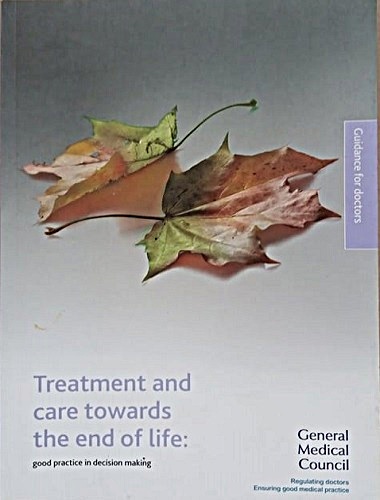Description
Patients who are approaching the end of their life need high-quality treatment and care that supports them
to live as well as possible until they die and assures
their dignity in the dying process.
In the last few years, there have been significant
developments and improvements in care for patients
nearing the end of life. These have been led and supported
through government and professional strategies across the
UK. Nonetheless, we know that end-of-life care continues
to raise emotional, practical and ethical challenges for
the healthcare team. These include difficult discussions
with patients and their relatives, uncertainties about the
benefits and burdens of treatments, and managing care
provided across a range of settings.
The General Medical Council (GMC) has revised and
updated earlier guidance and produced a new booklet of
advice to help doctors and other healthcare professionals
navigate the complex ethical principles that help them
make decisions at the end of life and provide better care
to patients.1
This guidance complements the end-of-life care
strategies, pathways and programs that are being
developed across the UK and the clinical advice provided by
professional bodies, such as the medical Royal Colleges and
the National Council for Palliative Care.2 It is designed to
provide a framework of principles on which good care can
be founded and to be used as the basis of decision making
when difficult choices have to be made. The guidance is
based on five key principles.
1. Equality and human rights:patients who are
approaching the end of life are entitled to receive the same
quality of care as all other patients. All patients, and those
close to them, must be treated with dignity, respect and
compassion. Their individual needs must be considered and,
wherever possible, met.
2. Presumption in favor of prolonging life:clinicians
making decisions about potentially life-prolonging
treatment must start from a presumption in favor of
prolonging life; their decisions must not be motivated by
a desire to bring about the patient’s death. However, there
is no absolute obligation to prolong life irrespective of
the consequences for the patient and irrespective of the
patient’s views.
3. Presumption of capacity:clinicians must work on
the presumption that every adult patient has the capacity
to make decisions about their care and treatment. Where a
patient’s capacity is clearly impaired, clinicians must make
an assessment of whether the patient is able to make the
particular decision in question.
4. Maximizing capacity:if a patient’s capacity to make
a decision may be impaired, clinicians must provide the
patient with all appropriate help and support to maximize
their ability to understand, retain, use or weigh up the
information needed to make that decision or communicate
their wishes.
5. Overall benefit:if an adult patient lacks capacity
to decide, the decisions clinicians make on the patient’s
behalf must be of overall benefit to the patient.
The guidance provides two decision-making models:
one for adult patients who have capacity to make
decisions; and one for patients who lack capacity.
These reflect both the ethical principles and the
legal requirements across the UK. In particular, they
emphasize the need for working in partnership – with
the patient, where possible, with the patient’s family
and carers, and with the wider healthcare team.
General Inquiries
There are no inquiries yet.
















Reviews
There are no reviews yet.